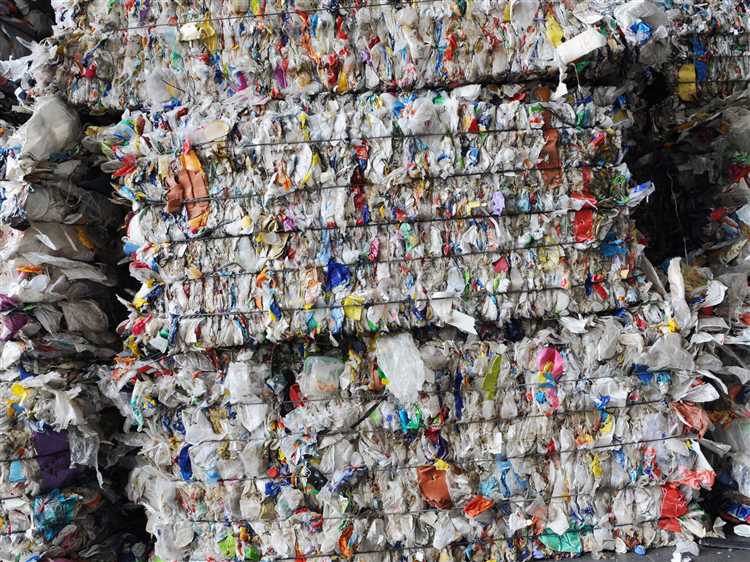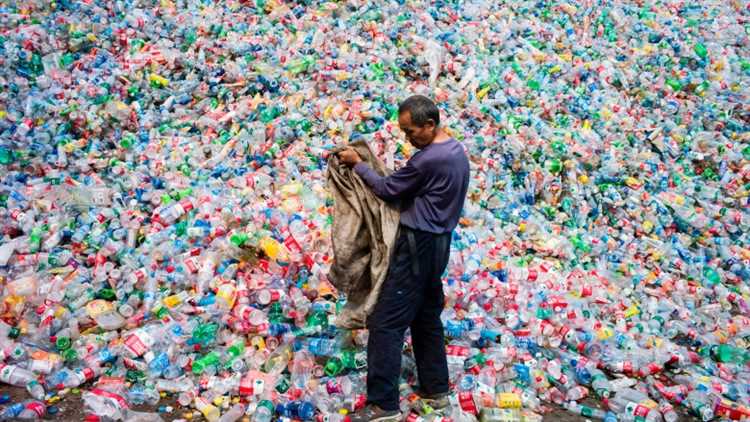
China has long been considered the world’s recycling powerhouse, importing massive amounts of recyclable materials from countries around the globe. However, recent changes in China’s recycling policies have left many wondering: do they still buy our recyclables?
For years, China was the go-to destination for many countries looking to offload their recyclable waste. The country’s booming manufacturing sector made it an ideal market for recyclables, which were often transformed into new products for export. This symbiotic relationship allowed many countries to meet their recycling goals while also fueling China’s economic growth.
However, in 2017, China implemented a new policy known as “National Sword” which restricted the import of certain types of solid waste, including many types of recyclables. The policy aimed to address concerns about environmental pollution and public health issues associated with the recycling industry. As a result, many countries that relied heavily on China as a buyer for their recyclables were left scrambling to find new markets.
Despite the restrictions, China is still a major player in the global recycling industry. The country has shifted its focus towards domestic recycling, investing in technologies and infrastructure to process and reuse its own waste. This move has created opportunities for local recycling industries to grow and has also led to the development of new markets for recyclables in other countries.
In conclusion, while China’s restrictions on the import of recyclables have certainly impacted the global recycling industry, the country’s role in recycling is far from over. As China continues to invest in domestic recycling and explore new markets for recyclables, it remains a key player in the global effort to reduce waste and promote sustainability.
- The Rise of China’s Recycling Industry
- Government Support and Regulations
- Technology and Innovation
- China’s Import Ban on Certain Recyclables
- The Impact on Global Recycling Markets
- Decreased Demand and Increased Costs
- Shift in Global Recycling Balances
- New Opportunities for Innovation
- China’s Emerging Role as a Recyclables Exporter
- Alternatives to China’s Recycling Market
- 1. Developing Domestic Recycling Infrastructure:
- 2. Exploring Other International Markets:
- The Future of Recycling: Collaborating with China
- The Importance of Collaboration
- Exploring New Opportunities
- The Role of Innovation
- Question-answer:
- How has China’s role in recycling changed?
- Why did China implement the National Sword policy?
- What impact did the National Sword policy have on recycling in other countries?
- Is China still buying our recyclables?
The Rise of China’s Recycling Industry

Over the past few decades, China has emerged as a global leader in the recycling industry. With its massive population and rapid industrialization, the country has faced significant environmental challenges. However, these challenges have also presented opportunities for innovation and growth in the recycling sector.
One of the key factors that contributed to the rise of China’s recycling industry is the country’s high demand for raw materials. As China’s economy continued to expand, so did its need for resources. Recycling became an attractive alternative to importing raw materials, as it not only reduced dependence on foreign sources but also helped alleviate environmental issues associated with mining and extraction.
Government Support and Regulations
The Chinese government played a crucial role in promoting the recycling industry. It implemented various policies and regulations to incentivize recycling and ensure the proper management of waste. For instance, China introduced the Circular Economy Promotion Law in 2008, which emphasized the importance of resource conservation, waste reduction, and recycling.
The government also provided financial support and tax incentives to recycling companies, encouraging investment and technological advancements. These measures helped create a favorable environment for the growth of the industry, leading to the establishment of numerous recycling facilities across the country.
Technology and Innovation
China’s recycling industry has also benefited from advancements in technology and innovation. The country has invested heavily in research and development to improve recycling processes and develop more efficient and cost-effective methods.
One notable area of innovation is the development of automated sorting systems. These systems use advanced sensors and artificial intelligence to separate different types of recyclables, increasing the efficiency and accuracy of the recycling process. This technology has significantly reduced the reliance on manual sorting, lowering labor costs and improving overall recycling rates.
- China has also made significant progress in the recycling of electronic waste. With the rapid growth of the consumer electronics market, the country has become one of the largest producers of electronic waste globally. However, it has also developed advanced recycling technologies to extract valuable metals and components from electronic waste, reducing the environmental impact.
- In addition to technological advancements, China has also focused on raising awareness and promoting recycling initiatives among its population. Education campaigns and community programs have helped instill the importance of recycling and waste management in the public.
Overall, the rise of China’s recycling industry can be attributed to a combination of government support, technological advancements, and growing awareness of environmental issues. As the country continues to prioritize sustainability, the recycling industry is expected to play an even more significant role in waste management and resource conservation.
China’s Import Ban on Certain Recyclables
China has long been the largest importer of recyclable materials from countries around the world. However, in recent years, the Chinese government has implemented a series of import restrictions and bans on certain types of recyclables.
The import ban was first announced in 2017, with the Chinese government stating that it would no longer accept certain types of solid waste, including unsorted paper and some types of plastic. This ban was put in place to address concerns over environmental pollution and public health risks associated with the processing and disposal of these materials.
The ban has had a significant impact on the global recycling industry, as many countries relied heavily on China as a destination for their recyclables. With the ban in place, these countries have had to find alternative markets or invest in domestic recycling infrastructure.
Despite the import ban, China still remains an important player in the recycling industry. The country has invested heavily in developing its own recycling infrastructure and technologies. In addition, China has implemented stricter quality standards for the recyclables it does accept, in order to ensure that the materials are properly processed and disposed of.
While the ban has presented challenges for the global recycling industry, it has also created opportunities for innovation and investment in waste management and recycling technologies. Many countries are now exploring ways to improve their own recycling systems and reduce their reliance on exporting waste.
In conclusion, China’s import ban on certain recyclables has had a significant impact on the global recycling industry. While it has presented challenges, it has also created opportunities for countries to improve their own recycling capabilities and promote sustainable waste management practices.
The Impact on Global Recycling Markets
The decision by China to heavily restrict the import of recyclable materials has had a significant impact on the global recycling markets. Prior to China’s restrictions, it was the destination for a large percentage of recyclable materials from countries around the world.
Decreased Demand and Increased Costs

With China no longer buying recyclables in large quantities, there has been a sharp decrease in demand for these materials in the global market. This has led to a surplus of recyclables and a decrease in their value.
As a result, recycling programs in many countries have struggled to find new buyers for their recyclable materials, and in some cases, have even had to stockpile or dispose of them in landfills.
In addition to decreased demand, the cost of recycling has also increased. With fewer buyers, recycling facilities have had to pay more for the transportation and processing of recyclable materials. This increased cost has put a strain on recycling programs, some of which have been forced to cut back or even shut down.
Shift in Global Recycling Balances
China’s restrictions on recyclable imports have also caused a shift in the global recycling landscape. Countries that were previously dependent on China as their primary buyer have had to find alternative markets.
Some countries have turned to other Asian countries, such as Vietnam and Malaysia, to sell their recyclable materials. However, these countries have also started to impose stricter regulations and limitations on imports, which has further limited the options for recycling programs.
Other countries have invested in building their own recycling infrastructure in an effort to become more self-sufficient. This includes the development of advanced sorting and processing facilities that can handle a variety of recyclable materials.
New Opportunities for Innovation
While China’s restrictions have undoubtedly caused challenges for global recycling markets, they have also created new opportunities for innovation. With increased pressure to find solutions to the recycling crisis, companies and governments have started to explore alternative methods of recycling and waste management.
There has been a renewed focus on developing and implementing more efficient recycling technologies, such as chemical recycling and advanced sorting systems. These innovations have the potential to revolutionize the recycling industry and make it more sustainable and economically viable in the long term.
| Country | Recyclables Exported (tons) | Year |
|---|---|---|
| United States | 32,040,550 | 2019 |
| Germany | 13,096,745 | 2019 |
| Japan | 8,575,231 | 2019 |
| United Kingdom | 7,263,848 | 2019 |
Source: Global Recycling Statistics 2019
China’s Emerging Role as a Recyclables Exporter
While China was once the world’s largest importer of recyclables, their role in the global recycling market is evolving. In recent years, China has been transitioning from being a net importer to becoming a significant exporter of recyclable materials.
This shift can be attributed to several factors. One major factor is the Chinese government’s efforts to increase domestic recycling capacity and reduce dependence on imported materials. They have implemented policies and regulations that incentivize domestic recycling businesses and support the development of recycling infrastructure.
Additionally, China’s growing economy and industrialization have led to an increase in domestic waste generation. As a result, there is a greater supply of recyclable materials within the country, which can now be exported to other countries in need of these resources.
China’s emergence as a recyclables exporter has also been influenced by changes in global recycling markets. In recent years, many countries have imposed stricter standards on the quality of imported recyclables, making it harder for China to import certain types of materials. As a response, China has shifted its focus to processing and exporting higher-quality recyclables that meet these stricter standards.
This change in China’s role as a major player in the global recycling industry has had wide-reaching effects. Countries that once relied on China as their primary buyer for recyclables have had to seek alternative markets or invest in domestic recycling infrastructure. This has led to increased competition in the global recycling market and a need for countries to improve their own recycling capabilities.
Overall, China’s emerging role as a recyclables exporter reflects their commitment to sustainable waste management and recycling. As China continues to invest in domestic recycling infrastructure and improve the quality of their exported recyclables, they are likely to play a significant role in shaping the future of the global recycling industry.
Alternatives to China’s Recycling Market
In recent years, China’s decision to limit the import of recyclables has had a significant impact on the global recycling industry. As countries around the world grapple with finding alternative markets for their recyclables, several options have emerged.
1. Developing Domestic Recycling Infrastructure:
One alternative is for countries to invest in their own domestic recycling infrastructure. By building or expanding recycling facilities within their borders, countries can reduce their dependence on exporting recyclables. This approach not only creates jobs and stimulates the economy, but also promotes a more sustainable and circular approach to waste management.
2. Exploring Other International Markets:
Another option is for countries to explore other international markets for their recyclables. While China was once the dominant player in the recycling market, countries like India, Vietnam, and Malaysia have emerged as potential destinations. These countries have shown an increasing demand for recyclable materials and have the capacity to process and reuse them.
It’s important, however, to ensure that these alternative markets have strong environmental and worker protection regulations in place to prevent the negative impacts that occurred in China’s recycling industry. This includes proper handling and disposal of hazardous materials, fair treatment of workers, and adherence to sustainable recycling practices.
Furthermore, diversifying the export destinations for recyclables can help mitigate the risk of reliance on a single market. By spreading the export of recyclables across multiple countries, the global recycling industry can become more resilient to policy changes and market fluctuations.
In conclusion, while China’s decision to restrict the import of recyclables has caused disruption in the global recycling industry, it has also prompted countries to explore alternative options. By investing in domestic recycling infrastructure and exploring other international markets, countries can reduce their reliance on China and create a more sustainable and resilient recycling system.
The Future of Recycling: Collaborating with China
In recent years, China’s decision to restrict the import of foreign recyclables has disrupted the global recycling industry. However, this does not mean that the recycling relationship between China and other countries has come to an end. Instead, it presents an opportunity for collaboration and innovation in the recycling sector.
The Importance of Collaboration
Collaborating with China in the field of recycling is crucial for several reasons. Firstly, China is the world’s largest producer and consumer of recyclable materials. With its vast manufacturing capabilities, China has the potential to create new technologies and processes that can revolutionize the recycling industry.
A partnership with China also ensures a more sustainable approach to recycling. By working together, countries can share expertise, technologies, and best practices to improve recycling processes and reduce waste. This collaboration can lead to the development of more effective and efficient recycling systems that benefit both China and other countries.
Exploring New Opportunities
The restriction on importing foreign recyclables has prompted countries to find alternative solutions and explore new opportunities. This includes investing in domestic recycling infrastructure, developing advanced recycling technologies, and diversifying export markets.
Collaboration with China can further enhance these efforts. By sharing knowledge and resources, countries can work together to develop innovative recycling technologies that can address the challenges posed by changing global recycling trends. China’s experience and expertise can provide valuable insights and guidance to other countries looking to improve their recycling processes.
The Role of Innovation
Innovation plays a vital role in the future of recycling. As the world shifts towards a more sustainable and circular economy, new technologies and processes will be required to transform waste into valuable resources.
China’s reputation as a global leader in manufacturing and technology positions it as a key player in driving recycling innovation. By fostering collaboration and sharing research and development efforts, China can contribute to the creation of more efficient recycling technologies, such as advanced sorting systems and chemical recycling methods.
The future of recycling lies in collaboration and innovation. By working together with China, countries can overcome the challenges posed by changing global recycling dynamics and create a more sustainable and efficient recycling industry.
Question-answer:
How has China’s role in recycling changed?
In recent years, China’s role in recycling has undergone significant changes. Previously, China was the world’s largest importer of recyclables, accepting a large portion of waste from other countries. However, in 2018, China implemented a new policy called the National Sword, which banned the import of certain types of solid waste.
Why did China implement the National Sword policy?
China implemented the National Sword policy to address the environmental and health issues associated with the importation of low-quality recyclables. The country was experiencing problems with contaminated and hazardous waste being mixed in with recyclables, leading to pollution and health risks. The policy aimed to improve the quality of the recyclables being imported and promote domestic recycling.
What impact did the National Sword policy have on recycling in other countries?
The National Sword policy had a significant impact on recycling in other countries. With China no longer accepting certain types of waste, many countries were left with a surplus of recyclables that they couldn’t find buyers for. This led to stockpiling of recyclables, increased disposal costs, and a need to find alternative markets for recycling. Some countries have started investing in domestic recycling infrastructure, while others have turned to other markets such as Southeast Asia.
Is China still buying our recyclables?
No, China is no longer buying as many recyclables as it used to. The National Sword policy greatly reduced the types of waste that China accepts, making it much more difficult for other countries to export their recyclables to China. The policy has prompted other countries to reevaluate their recycling practices and seek new markets or develop domestic recycling capabilities.